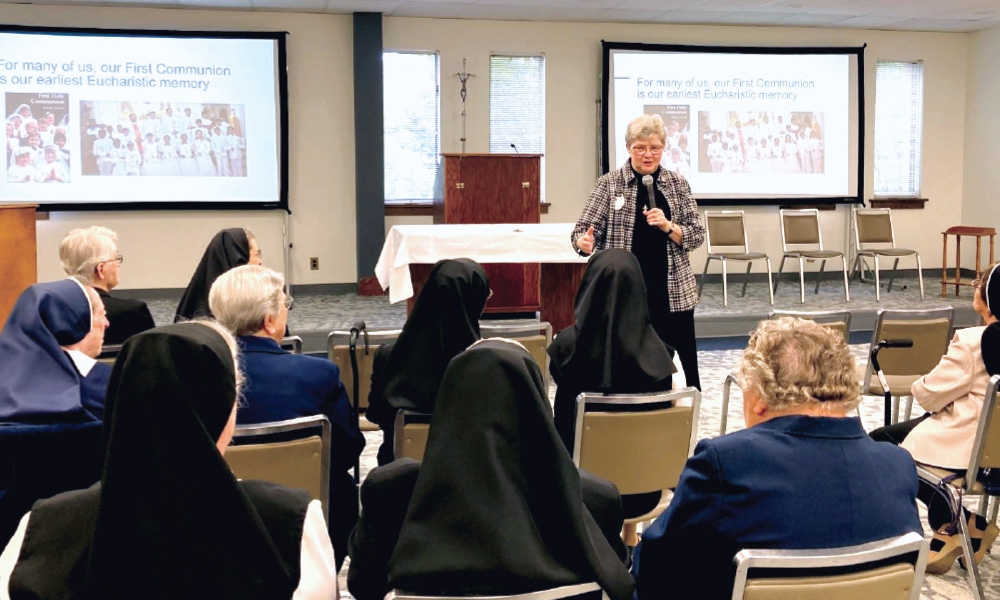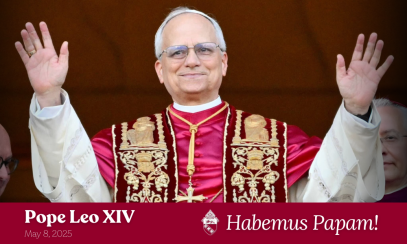
Poor, Holy Souls and the Bootcamp for Everlasting Glory
“I’ve always been a poor soul.” Before our religious community’s general superior quoted Sister Nazarius in a tribute at her funeral, I had heard the deceased sister say it — at least 20 years before, in fact.
“I’ve always been a poor soul.” Before our religious community’s general superior quoted Sister Nazarius in a tribute at her funeral, I had heard the deceased sister say it — at least 20 years before, in fact.
Sister Nazarius was born on All Souls’ Day, Nov. 2, 1907, which explained her whimsical statement. I was a novice in our Sts. Cyril and Methodius community, and I noticed that she usually said it as she was entering or leaving chapel, directing the statement to anyone who caught her eye. Somehow, her short, elfin form comes back to me from time to time as we celebrate All Saints and All Souls — the latter often referred to as “the holy souls” or the Church Suffering.
Sister Nazarius was little, short in stature, slender, agile even as a senior (quite senior) sister. Perhaps not surprisingly, she had a lifelong devotion to St. Thérèse of Lisieux, the Little Flower. Before her return to the motherhouse as one of our resident elders, she had always taught small children, classrooms full of kindergarteners, first and second graders. Like quite a few of us sisters, she moved with some frequency, having longer stints (nine years in Perth Amboy, New Jersey, for instance) and some shorter ones as the need arose. All told, she served in 10 different dioceses or archdioceses in the course of her nearly nine decades of life.
Sister Nazarius always seemed self-effacing and sweet as I recall. She was prayerful, humble, faithful and ready to offer quiet help. Because she was already past her teaching years, I can’t say whether or not she was always patient, compassionate, solicitous and fair with her young charges or whether she ever got grumpy in the convent. It would be hard to picture, though. When she taught second graders, she obviously prepared them for first penance and communion. I don’t know how much she emphasized and exemplified God’s mercy as she did that, but I would think so based on the experience of having been around her. So, I can’t imagine much about her that might have merited purgatory. I suppose it’s possible there might have been some thing that caused her not to die 100% ready for the beatific vision and canonization.
That’s the thing. When we talk about purgatory and the “poor souls,” we’re talking about people like ourselves — basically decent, generally good, well-intended but a bit rough around the edges in one way or another. Most of us have no trouble thinking of things to mention in confession. And thus, we’re quite sure as Catholics that a merciful God offers us the opportunity to be polished and perfected even after we’ve died. That’s really what purgatory is about. I picture it as a kind of boot camp for everlasting glory.
Interestingly enough, televangelist Joyce Meyer has been known to muse that God must offer us an opportunity for “continuing education” in grace and virtue upon our life’s end. Her Protestant tradition doesn’t profess a belief in purgatory, but that sounds uncannily like purgatory.
But there’s another thing. We’ve used expressions like “poor souls” and “holy souls.” The latter insists that good, loving, God-fearing but not quite perfect people can be deemed “holy” even if they need a bit of work. St. Paul referred to the early Christians as holy, as saints, even while pointing out the need for improvement in certain areas. “Poor souls” on the other hand can sound quite desperate. We picture them longing but not quite achieving heaven and God. However, that is not a dead end.
The “poor souls” suffer the pain of separation and the fact that it is self-induced, yet they know that the separation is only temporary. Theirs is an afterlife of hope, one not measurable in human time. Perhaps the expression needs a second look. A number of people who are deemed poor are quite content with their lot and adaptable. They know what they lack, but they can also be grateful for what they do have. They are wise and simple enough to realize that they are not self-sufficient. So maybe, maybe, most importantly, the “poor souls” are those who know they depend on sheer grace, plentiful redemption and the prayerful support of the Church to fill what they lack.
Sister Nazarius seems to have been telling me that in her very quiet way. We cannot become holy on our own. As Christians, we cannot be a solo act. None of us have everything we need. And we’re never quite ready for heaven — without, that is, all the props and prompts and graces that come from the heart of God, from the communion of saints, from the most trivial of good deeds and all the prayers that rise like incense.
And so we pray: May she and all the souls who sleep in Christ — and we, when our time comes — rest in peace.
Sister Pamela Smith, SSCM, Ph.D., is the diocesan director of Ecumenical and Interreligious Affairs. Email her at psmith@charlestondiocese.org.



